Like Robert Mitchum, Stewart Granger is one of those actors who just needs to be in a film for me to want to see it. When the film in question boasts of Deborah Kerr opposite Granger, lots of swordplay and palace intrigue, a magnificently villainous villain, and some very fancy costumes: my day is made. And, best of all: not one Granger, but two: he’s in a double role here (well, one of the characters is hardly there, but still). Yippee!

So, without further ado, let’s begin with the story. Sometime in the late 19th century, in a fictional country called Ruritania, a train stops by at the capital, Strelsau. Ruritania’s new king, Rudolf V, is to be crowned, and hordes of visitors are descending on Strelsau for the festivities. Among those arriving is Rudolf Rassendyll (Stewart Granger), an Englishman who admits he’s here not for the coronation, but for a holiday—he wants to go trout fishing.

Rassendyll ignores the startled looks of the locals; and he doesn’t notice the poster of the new king of Ruritania, who’s the spitting image of Rassendyll himself. Rassendyll goes off to the province of Zenda to fish (completely disregarding a `Fishing prohibited’ sign), and dozes off. He is awakened by two of the king’s men, Colonel Sapt (Louis Calhern) and Fritz von Tarlenheim (Robert Coote). Both are amazed at Rassendyll’s resemblance to the king.

The king too comes along, and the mystery is cleared up: Rudolf V’s great-great-grandfather had gone to England and been up to some hanky-panky with Rassendyll’s great-great-grandmother, and ever since, every couple of generations, a Rassendyll is born with the features of the Ruritanian royal family. Rudolf is a jovial, carefree sort; when he asks Rassendyll what the Englishman’s being doing and the reply is that, like their mutual ancestor, he’s guilty of “fishing in forbidden waters,” Rudolf’s very amused. He invites Rassendyll to his hunting lodge nearby.
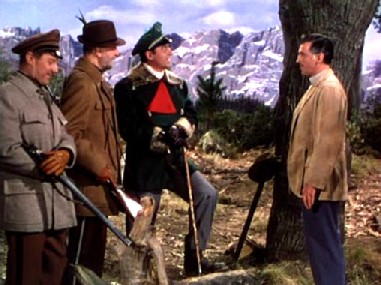
At the hunting lodge, they talk, eat and drink long into the night. The coronation is to be held the next day, and Rudolf tells Rassendyll about his enemy, his half-brother Michael, Duke of Strelsau, who wants the throne for himself. As the night progresses, the king begins to reveal some of his frailties: he drinks like a fish, and when Sapt tries to intervene, he slaps the older man.

Sapt leaves, and with both Rassendyll and von Tarlenheim now asleep, Rudolf finds himself the only customer for the latest bottle of wine fetched from the cellar. He almost returns it, then changes his mind and has a hefty swig. The next thing he knows, he’s feeling dizzy, reeling—and then keeling over onto the carpet, dead to the world.

The next morning, Sapt wakes Rassendyll (by splashing him with a jug of water: why not just shake him by the shoulder?). The news is dire: the king isn’t dead, but he’s deeply unconscious and Sapt (I didn’t know this guy was a doctor too) says he’ll remain so for the next few hours. And the coronation can’t be postponed; it’ll simply give Michael the opportunity he needs to grab the throne. There’s only one solution, and he’s staring them in the face.

Rassendyll refuses. This just won’t do and he’s bound to be caught. But Sapt and von Tarlenheim are nothing if not good at persuasion, and they succeed, mainly by reassuring Rassendyll that it’ll be only for one day. By nightfall the king will be right as rain and will take over. Rassendyll’s moustache is shaved off (thank heavens! I never liked it), his greying sideburns are covered over with boot blacking, and he’s given a crash course in how to behave like royalty. On the train to Strelsau, von Tarlenheim and Sapt help him rehearse the oath of office.

At Strelsau, meanwhile, the villains have been rejoicing. Michael (Robert Douglas) has already prepared his declaration of assumption of power as the Regent. His mistress, a Frenchwoman called Antoinette (Jane Greer) is anxious, because she’s realised that the throne isn’t the only thing Michael’s got his eye on. He’s equally fascinated by the Princess Flavia, intended consort of the king, whom he intends to marry once he’s on the throne.

Michael has little time for Antoinette and her fears. Michael’s henchman, the slimy and sharp-tongued Rupert, Count of Hentzau (James Mason), comes to report on the successful sabotage of the coronation: with the king missing, it can’t possibly take place. When Michael leaves, Rupert tries to flirt (in a nasty, contemptuous fashion) with Antoinette, and then goes to join Michael. They stand outside, waiting along with hundreds of others, for the king who won’t come.

But the king—in the convincing form of Rassendyll—does come, and Michael and Rupert are flabbergasted. This is just not on.
Nobody else realises the deception, not even the gorgeous Princess Flavia (Deborah Kerr), who, though she’s been intended as Rudolf’s bride since her childhood, hasn’t seen him for years. Rassendyll is obviously quite dazzled by her.

The coronation over, Rassendyll gets to know Flavia better in the coach as they drive back to the palace, waving to the crowds. Flavia says he’s changed a lot since she knew him, and it’s apparent she likes the changed version much better than the original. Rassendyll tells her she’s the loveliest woman in the world. There’s a romance blooming here, but it’s interrupted by the nasty Michael (who still hasn’t figured out what happened, but has sent Rupert to investigate).
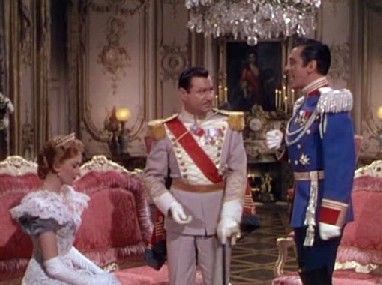
The next morning, the charade now drawing to a close, Rassendyll accompanies Sapt and von Tarlenheim to the hunting lodge where they’d left the king to sleep it off. They’re in for a nasty surprise: the king is gone; in his place is the corpse of the old butler.

So Rassendyll will have to go on playing king, at least until they’re able to find Rudolf. They’re at an impasse: Michael and Rupert dare not expose Rassendyll, because that’ll mean admitting they’ve kidnapped the real king.
While Sapt and von Tarlenheim are searching for clues to the king’s whereabouts, Rassendyll falls deeper in love with Flavia—so much so that at the ball that evening, he comes close to confessing all to her. (One thing puzzles me: although Rassendyll hugs and kisses Flavia often enough, why doesn’t the boot blacking from his sideburns rub off onto her cheek?)
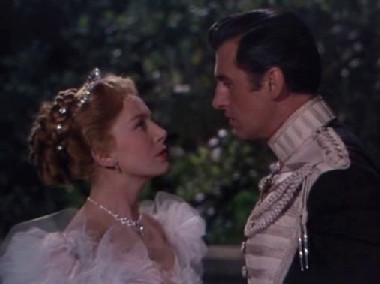
Sapt interrupts him in time, though, and their secret is saved. But Rassendyll is growing increasingly frustrated: he loves Flavia but realises that this may well be a doomed love. The knowledge that she thinks him to be the king—plus the fact that he is a king only till Rudolf is found—is taking its toll on him. And Sapt, though understanding, is brutally clear on one point: his loyalties are to his king and country.
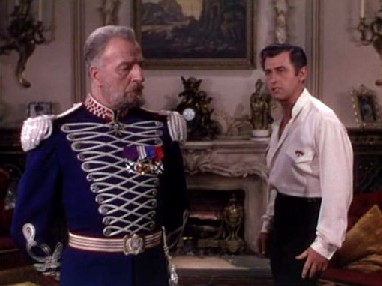
Now, just as things are hotting up, another element is introduced: Rassendyll receives a letter, addressed to him by name, c/o von Tarlenheim. If he wants to know the whereabouts of the king, he should to come to a midnight rendezvous at an old deserted summerhouse. Rassendyll is, with reason, suspicious: there’s something fishy in all of this.

Where is Rudolf held captive? Who is Rassendyll’s mysterious helper? Will Flavia get to know who the man she loves really is? Who will rule Ruritania: a vicious villain, a `play-actor’ (as Rupert of Hentzau dubs Rassendyll), or a drunkard with more failings than virtues?
What I liked about this film:
Stewart Granger and Deborah Kerr. They are individually so good—very nice to look at, excellent actors—and together, they’re great. The chemistry between them is fabulous. One of my favourites is the scene in the room after the coronation: she tells him he called her a `clumsy little scarecrow’ when she was a girl; he decrees he should’ve been horsewhipped (and she admits that was what she’d said too!)
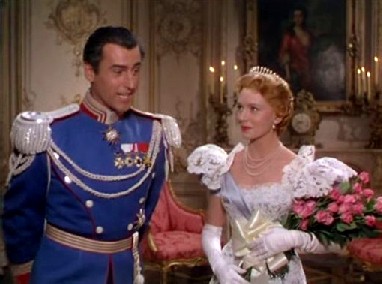
The plot. The story isn’t a faithful reproduction of Anthony Hope’s novel, but it’s entertaining enough. There’s romance, drama, humour (Rupert of Hentzau has some deliciously nasty one-liners), and plenty of swordplay—not as beautifully choreographed as in Scaramouche, but adequate. And the plotting of Michael and his minions is simple enough to not be confusing, yet intriguing enough to be interesting.
What I didn’t like:
James Mason as Rupert of Hentzau. In the book, Rupert is a rakish young man; in this film he looks definitely well into his forties. James Mason does manage to portray a credibly evil character, but the combination of youth and devilry is a vastly more potent one, which this depiction of Rupert misses by a mile. For a much more chilling portrayal, see the BBC’s television version of The Prisoner of Zenda—a 24-year old Jonathon Morris played Rupert in that, to very good effect.
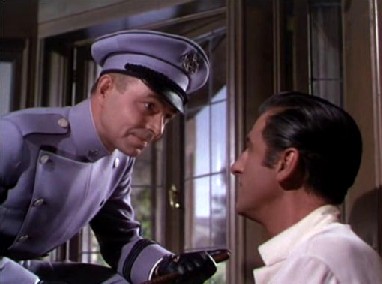
The end. Oh, no, no. Not at all what I’d have wanted.
Little bit of trivia:
I noticed how many similarities this one has with Granger’s other hit swashbuckler, Scaramouche. Both are historicals (well, The Prisoner of Zenda is set in a fictional country, but it’s still in the 19th century). Both are set in Europe—Scaramouche is in France, Ruritania is supposedly somewhere between Vienna and Bucharest. Both have Granger as a character who masquerades—because of politics—as someone he isn’t: a mummer and a king, respectively. Both have him succumbing to a forbidden love: in The Prisoner of Zenda, with a princess betrothed to a king; in Scaramouche, with his own half-sister. And of course, both have some rather impressive swordplay, though Scaramouche wins in that department: it’s spectacular.

I looooove this film – I think it was the first Granger movie I saw (on TCM). When they aired it next I eagerly re-watched, only to be disappointed to see Ronald Coleman playing the lead! :-( Coleman is also nice but he’s NOT Granger!
Rassendyll’s moustache is shaved off (thank heavens! I never liked it)
– lol Agree completely. I remember Jean Simmons expressing similar sentiments in Adam and Evelyn! ‘stache is not for the likes of him.
Scaramouche vs this – I think the former is more fun but this is way more romantic and for me the romance wins every time. Yes, inspite of the ending (she does end up with one Granger after all – that has to be good!). ;-)
LikeLike
I haven’t watched the Ronald Coleman version, even though most people on the imdb message boards seem to think that tops this one. I can, without having seen that one, (and self-confessedly completely prejudiced!) say this one’s better: anything with Granger is better than something without Granger!
Oh, now I want to see Adam and Evelyne: sounds good! Will look out for it.
And yes, Scaramouche is way more fun, but even though this is generally more romantic, I still don’t like the end :-(
LikeLike
i just love to watch stewart he is handsome and the heroic fellow i have watched in a long time. i have some of his films not a lot i prefer him as the good guy and where he lives in the movie he makes romance look really neat but in fact. but in fact you don’t see that in movies anymore. ray maland and cary grant were the same way. i am an old movie buff my self and i like debra kerr and stewart granger together the best of any that has been with him. a stewart fan virginia
LikeLike
Me too! I think Ray Milland and Cary Grant were wonderful too, and Stewart Granger – oh, he was in a class apart. :-) Another of my favourite Granger films is the fabulous Scaramouche – I like that even better than The Prisoner of Zenda, he’s just so perfect in it.
LikeLike
This is one of my favourite novels and I like both versions of the film, though I agree with you about James mason. In general, i love this era of films…so miss TCM!
LikeLike
Yes. TCM was sadly so shortlived in India. :-(
LikeLike
I miss TCM too. You’re so right, I imagine Rupert, from the novels as much less smarmily evil and much more fun but evil than James Mason, who’s too ponderous.
LikeLike
‘Ponderous’ – yes! That’s the right word for Mason. I like him otherwise, but he just didn’t fit the role here.
LikeLike